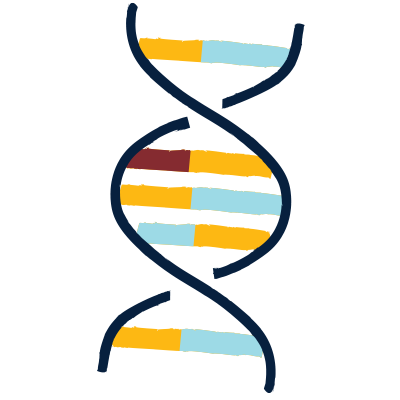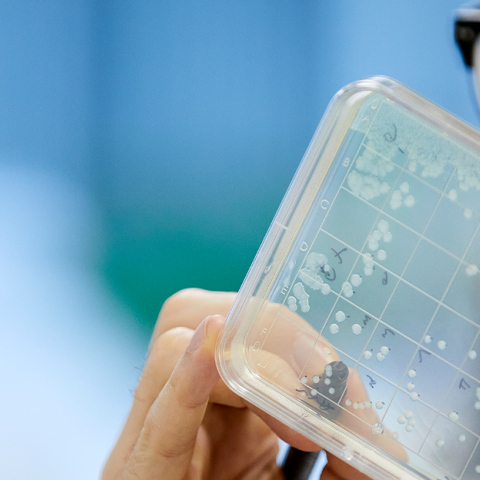Information on the Venture and Innovation Awards we fund
We’re funding a range of Venture and Innovation Awards (VIAs) researching key topics in cystic fibrosis.

Understanding and treating lung infections
For those with CF, infections can be difficult to treat, increase the burden of care and lead to long hospital stays, and can cause permanent lung damage.
-
Developing a point-of-care test for the diagnosis and treatment of Aspergillus fumigatus
Dr Anand Shah, Royal Brompton Hospital and Imperial College London
Our contribution: £38,000
Partner contribution: Medical Research Council, £247,350The fungal infection Aspergillus fumigatus is becoming difficult and expensive to diagnose and more resistant to existing treatments. The aim of this research project is to improve the accuracy of diagnosing Aspergillus and to identify whether the infecting strain will be resistant to current drugs by developing a low-cost device that may be able to be used in hospitals in the future.
-
RAPID-test – developing a home-monitoring test
Professor Jane Davies, Imperial College London and Dr Collin Sones, University of Southampton
Our contribution: £90,000
Partner contribution: Engineering and Physical Sciences Research Council (EPSRC), £786,000Detecting what bugs people with CF are growing requires hospital tests and a few days before treatment can begin. Developing a dipstick-like test for to use at home would allow treatments to begin sooner. Currently the researchers are developing the test to detect infection with Pseudomonas aeruginosa or Burkholderia cepacia. They also aim to be able to identify which antibiotics the bugs are resistant to at the same time.
-
Developing quicker tests for CF infections in the clinic
Professor Chris van der Gast, Manchester Metropolitan University
Our contribution: £45,950
Partner contribution: Manchester Metropolitan University, £45,950Detecting what bugs people with CF are growing requires hospital tests and a few days before treatment can begin. Researchers in Manchester are aiming to develop a test that will identify which infections someone has within a few hours. They hope that if a sample is taken at the start of a clinic appointment, the results will be back by the end of the appointment.
-
Can chemicals in exhaled air predict lung flare-ups?
Dr Mike Murphy, Owlstone Medical Limited, UK
Our funding: £36,000
Partners: Owlstone Medical and Royal Papworth Hospital, £108,000Flare-ups of poor lung health (also known as exacerbations) can require weeks of in-patient hospital treatment and cause permanent lung damage. If they can be detected earlier, their impact can be reduced. Researchers will investigate whether changes in chemicals in the air that people with CF breathe out can be used as a way of detecting the start of an exacerbation. This is a proof of principle study.
-
Investigating new ways to detect and treat antibiotic resistant Pseudomonas infection
Professor Miguel Camara, University of Nottingham, Co-director of National Biofilm Innovation Centre
Our contribution: £50,000
Partner contribution: University of Nottingham, £50,000As the numbers of bacteria grow during Pseudomonas infection, the levels of chemicals it releases reach a tipping point. Once the tipping point is reached these chemicals, known as ‘quorum sensing molecules’, make Pseudomonas less easy to treat with antibiotics.
In this PhD research project, the student will develop tests for detecting quorum sensing molecules clinically and test if blocking their activity improves the effectiveness of existing antibiotics.
-
Understanding how antibiotics affect the balance of bacteria in the lungs
Dr Martin Welch, University of Cambridge
Our contribution: £33,000
Partner contribution: National Centre for the Replacement, Refinement and Reduction of Animals in Research, £210,000The lungs of people with CF contain a wide range infection-causing bacteria. In order to treat CF lung infections more effectively, it is important to understand how these bugs interact with each other.
A mix of all the different bugs found in the lungs will be modelled in the lab by a PhD student in Cambridge. The lab model will be used to study the effect of antibiotics on how these bugs interact. This will inform the best way to prescribe antibiotics, in order to maintain a healthy balance of good bacteria while treating the infection.
-
What makes a lung infection become dominant in the CF lung?
Dr Laura Nolan, Imperial College London
Our contribution: £30,000
Partner contribution: Imperial College London, £206,000There may be a number of different infection-causing bacteria growing in the lungs of people with CF, but at different times of life, different bacteria become dominant. It isn’t understood what causes one bacteria to dominate others. Dr Laura Nolan has been awarded a fellowship to set up her own lab at Imperial College, and the Trust has awarded her some extra budget for consumables to allow her to progress this exciting area of research. Understanding more about how different infection-causing bacteria interact could lead to more effective treatments for these infections in the future.
-
Can a multiple sclerosis drug be used to increase effectiveness of antibiotics?
Professor Jane Davies, Imperial College London
Our contribution: £30,000
Partner contribution: Cycle Pharmaceuticals, £30,000When the multiple sclerosis (MS) drug glatiramer acetate (GA) was shown to have antibacterial effects against Pseudomonas, the Trust agreed to support Professor Davies and her biotech partner in exploring its potential further. This research funding is being used to investigate the Pseudomonas-strain-specific effects of GA in enhancing the effectiveness of existing, currently-used antibiotics.
-
Do drugs designed to improve the effectiveness of antibiotics work on Pseudomonas?
Professor Jane Davies, Imperial College London
Our contribution: £50,000
Partner contribution: Helperby Therapeutics, £50,000One way to tackle antibiotic resistance is to develop drugs to make bacteria more susceptible to current antibiotics. Biotech company Helperby are working with researchers within one of our Pseudomonas Strategic Research Centres to test the drugs in their development pipeline against specific strains of Pseudomonas. If their research is successful these drugs could reduce the burden of care during infections and reduce long-term lung damage by clearing infections faster.
-
Developing drugs to increase the effectiveness of NTM antibiotics
Neem Biotech, UK
Our contribution: £30,000
Partner contribution: Neem Biotech, £30,000We are providing support to researchers at the biotech company Neem to continue lab test on promising lead ‘would-be-drugs’ that work by increasing the effectiveness of current antibiotics against NTM bacteria.
-
How do NTM infections live alongside other bugs in the CF lung?
Professor Chris van der Gast, Manchester Metropolitan University
Our contribution: £48,000
Partner contribution: Manchester Metropolitan University, £48,000Developing NTM infection can have devastating consequences for people with CF, leading to increased lung damage and a year-long course of antibiotics that may not work, and may reduce their chances of a successful lung transplant. More research is needed to rethink how NTM is treated. This research study will investigate how NTM infections develop alongside other bugs within the lung. The results will provide important new information to apply in the development of more effective treatments.

Understanding and treating the symptoms of CF
We're funding research to reduce the impact of a range of different symptoms and complications of cystic fibrosis. These include better ways to diagnose, monitor and understand GI symptoms, refining and improving ways to monitor lung symptoms, and managing CF-related diabetes through the diet.
-
The idealised LCI (i-LCI): tuning in on the ‘silent years’ of paediatric CF
Professor Jane Davies, Imperial College London
Our contribution: £98,600
Partner contributions: Engineering and Physical Sciences Research Council (EPSRC), £500,000, Imperial College London, £50,000Standard tests of lung function are not sensitive enough to pick up lung damage in young children (aged between two and six years old). Professor Davies is collaborating with researchers at the University of Oxford to develop a new, more sensitive version of the lung clearance index (LCI). Over three years, it will be tested in gradually younger people with cystic fibrosis. If successful it has the potential to distinguish between permanent lung damage (such has lung scarring) and temporary narrowing (caused by excess mucus).
-
Gut Imaging for Function & Transit in CF - The GIFT CF study
Professor Alan Smyth, University of Nottingham
Our contribution: £35,000
Partner contributions: CF Foundation and Vertex Pharmaceuticals, £266,000To understand the best way to treat GI tract complications, it’s important to understand how the gut functions normally, and how it’s different in cystic fibrosis. The current ways to study gut function involve passing tubes into the gut or the use of Xx-rays. Professor Smyth is investigating whether MRI is a safer and less invasive alternative to these methods. If successful, he will extend the study to look at whether taking the CFTR modifying drug Orkambi has any effect on GI movement.
-
Organization and function of the gut microbiota in cystic fibrosis
Professor Chris van der Gast, Manchester Metropolitan University
Our contribution: £47,000
Partner contribution: Manchester Metropolitan University, £47,000Everyone has a range of bugs living in their intestines that contribute to keeping them healthy. In people with CF it is likely that how these bugs live and grow is different compared to people who don’t have the condition. The aim of this PhD research is to gain a better understanding of how the natural bugs are affected in cystic fibrosis. This could lead to more effective management of GI symptoms of CF such as DIOS.
-
Studying the effects of environmental factors on cystic fibrosis
Dr Fred Piel, Imperial College London
Our contribution: £85,000
Partner contribution: Imperial College London, £85,000More information is needed about how environmental factors affect cystic fibrosis.
We are funding two PhD students to develop this information. They have access to many detailed environmental datasets that can be overlaid with information about cases of CF, to identify any links between them. The factors they’re investigating include air pollution and geographical patterns of lung infection. This information can be used in the future to develop lifestyle advice and to campaign for changes in practices to reduce these factors.
-
Quantifying bronchiectasis severity in cystic fibrosis
Dr Joseph Jacob, UCL
Our contribution: £50,000
Partner contribution: UCL, £50,000Performing CT (computerised tomography) scans can help assess lung damage in cystic fibrosis. Currently, scans are analysed manually and it’s difficult to spot small changes within the lungs or monitor changes that happen over time. We’re co-funding a PhD student to develop a method to identify more subtle signs of lung damage using machine learning. This faster, more detailed analysis could assist doctors in assessing lung function as part of day-to-day care. It may also be used by researchers to assess the benefits of drugs in future clinical trials.
-
Dietary manipulation to improve glycaemic control
Ms Laura Birch, University of Bristol
Our contribution: £25,000
Partner contributions: NIHR, £269,498People with CF-related diabetes (CFRD) need to closely monitor their diet to control their blood sugar levels and ensure they’re eating enough calories. It is a difficult balancing act to achieve both and there is little evidence to guide practice on how best to achieve this. Research dietician Laura Birch is investigating whether following a low glycaemic index diet is feasible for people with CF, and whether this is a useful and acceptable way for them to manage their diabetes. The findings of this study will inform the design of future, large-scale studies.

Tackling the underlying cause of CF
Research is underway to tackle the underlying cause of cystic fibrosis (CF) in a number ofways. These studies include ways to improve the environment within the CF lung, and development of gene-based treatments to make healthy copies of the CF protein and understand how lung cells might be repaired.
-
Using modelling and machine learning to understand more about mucus in the CF lung
Dr Vivek Dua, Imperial College London
Our contribution: £50,000
Partner contribution: Imperial College London, £50,000How easy it is to clear the lungs of mucus in CF is based on the physical properties of the liquid lining the lungs, known as the air surface liquid. These physical properties include how watery, sticky and stretchy it is. Computer modelling and machine-learning approaches will be used to calculate the physical properties of the most easy-to-clear mucus. These figures can be used to design new mucus-clearing drugs in the future.
-
Developing a gene editing method that will work for any CFTR gene mutation
Dr Patrick Harrison, University College Cork, Ireland
Our contribution: £42,000
Partner contribution: Cystic Fibrosis Foundation, £ 126,000One way to treat cystic fibrosis is to permanently correct the damaged CFTR gene that causes the condition, known as gene editing. This technique is still under development and it is not yet available to people with CF. Most gene editing methods currently in development work by correcting specific mistakes within the gene, for example, correcting the common F508del mutation. However, Dr Harrison is developing a method of gene editing that has the potential to correct any gene mutation.
-
A genetic treatment approach to make healthy versions of the CF protein
Professor Stephen Hart, Institute of Child Health, UCL
Our contribution: £51,700
Partner contribution: Action Medical Research, £103,442Professor Hart will develop a gene therapy approach that cuts out some of the more difficult steps of this process. Rather than delivering new healthy copies of the CFTR gene itself, their approach is to deliver a protein-making template of the gene to the cells. This template is called mRNA. This research project will investigate the best way to ‘package’ the mRNA to deliver it safely into the lung cells.
-
Investigating cystic fibrosis lung repair
Dr Robert Gray, University of Edinburgh
Our contribution: £47,000
Partner contribution: Warren’s Wish Charity, £125,000Access to CFTR modulators will not improve the pre-existing lung damage that many people with CF are living with. Within the lining of the lungs are ‘basic’ lung cells, that when activated can be converted into more specialised lung cells. Using laboratory models, researchers in Edinburgh will study whether these cells could be activated to repair the CF lung damage. This includes working out whether the repair process is likely to be hampered by having cystic fibrosis.

Apply for a VIA
Venture and Innovation Awards (VIAs) support transformational and innovative research projects by providing financial support and bringing funding into the field of cystic fibrosis from external sources. Find out how to apply.
Research we fund
We fund research to tackle some of the most pressing issues in CF today. Find out how your donations are making a difference.
What is CF?
Cystic fibrosis, or CF, affects the lungs, digestive system and other organs. There are around 11,000 people living with it in the UK.
Get shopping
From beanies to mugs, we've got merch that's good enough to gift - or keep all to yourself!
